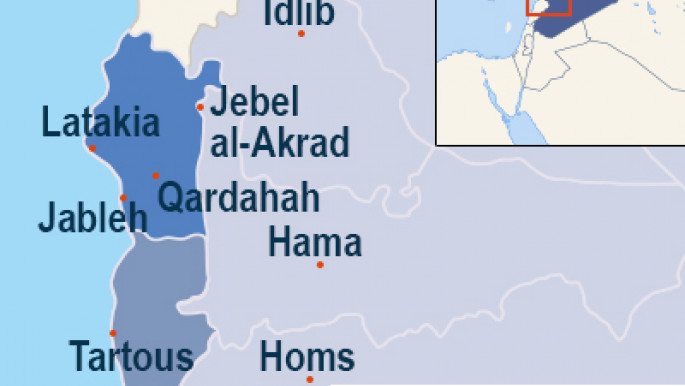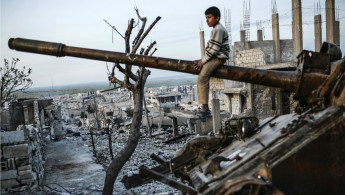Syria, Russia and Iran: A tale of three lovers
Russian military hardware and troops are pouring into Syria, and President Bashar al-Assad is presented with a blessing and a curse.
Increasingly isolated, Assad is in need of international support.
After losses to the Syrian rebels and Islamic State group and a failed conscription drive, Assad is desperate for the men and modern weaponry needed to push the war back from the brink.
But a reliance on Russian backing - along with existing support from Iran and Lebanese militia Hizballah – highlight Assad's weakness and ineptitude.
The Syrian regime now controls just a sixth of Syrian territory, according to IHS Conflict Monitor.
Losing and winning
Four years of war has cost 250,000 Syrian lives, and has puts an element of truth to the words of Assad - a former eye doctor - that victory would come "at any cost".
But the price so far has been heavy, both for the people of Syria and his bankrupt regime - and Assad's future is now essentially in the hands of other actors.
"The Syrian regime cannot afford to pay the Russians for the weaponry they are providing," says Marwan Kabalan, Syria researcher at the Arab Centre for Research and Policy Studies.
"The Russians are not seeing the Syrian conflict from a merely commercial perspective; although they seem to be very much interested in the offshore gas and oil recently discovered in Syrian territorial waters."
Kabalan says that Russian companies are already signing contracts with Damascus to explore and exploit gas and oil in regime-controlled Mediterranean waters.
| Read more: Russian oil company starts prospecting off Syria's coast |
In exchange, Kabalan believes that Syria is being gifted with some of Russia's most technologically advanced hardware, including four Su-30 fighter jets and a number of armoured vehicles.
It is not clear yet who will operate the warplanes spotted at Latakia airport.
However, for a regime reliant on crude barrel bombs dropped from helicopters, airpower is one of the few ways Damascus can make its presence felt throughout Syria, and with devastating results.
Russian troop movements in the regime's heartlands, where Moscow has its only warm sea port, comes after Damascus lost a number of important air bases, gas fields, and put rebels at the gates of Latakia province.
Latakia airbase appears to have been transformed into a Russian airstrip, while Tartous port is being expanded from a logistics depot into a naval base.
It has given Russia incredible influence over Syria's coastal territories, infrastructure and central regime, analysts say.
Man with a plan
President Vladamir Putin - a former KGB officer - has a track record of making shrewd and secretive moves that keep opponents guessing.
 |
| [Click to enlarge] |
His annexation of territory in Ukraine and the clandestine activities of Russian "irregulars" mirrors Moscow's slow military build-up in Syria.
Russia has its own financial problems. After Russian intervention in Ukraine, US and EU sanctions have hit hard.
Meanwhile, its Middle East opponent - Saudi Arabia - continues a strategy of keeping oil prices low hoping to dry out Moscow and Tehran's coffers.
Despite this, Putin has continued to prevent the collapse of the Syrian regime with arms and possibly troops.
"Russia has discovered that Syria is a very important bargaining chip in dealing with Arab Gulf states. It also helps Russia project itself as a great power on the cheap - given the lack of interest on the part of the US [on the war in Syria]," Kabalan adds.
Terror threat
Russia's multi-ethnic and multi-religious federation is also at threat of Syria's extremists.
Many of the most proven commanders of both the Islamic State group and the Nusra Front are fighters from Chechnya.
Russia is wary that these battle-hardened militants will return to the Caucuses and launch a new uprising against Moscow rule. Given the many Russian lives lost in the Chechnya wars, this is not a small concern for Putin.
"Some sources estimate that there are 2,400 Muslims from Russia and other Central Asian republics fighting with [IS]. Russia seeks to preserve the secular regime in Damascus and form a government that is loyal to Moscow - not Ankara, Riyadh, Washington or even Tehran," Kabalan said.
Russia's influence in the region has largely collapsed since the falls of friendly regimes including Baathist Iraq, South Yemen and Gaddafi's Libya.
Syria and Iran remain its only true partners in the region, and around 90 percent of Syria's arms reportedly originate from Russia or the former Soviet Union.
Despite previous US dominance in the Middle East, a power vacuum has arisen, as Washington appears to have enacted a partial disengagement from the region.
The geopolitical "pivot" lauded by Beltway bandits comes after a failed attempt to export "democracy" to Iraq and a nuclear deal with Iran.
| Read more: Russia ups the ante in Syria, writes James Denselow |
Washington's oil-rich Gulf allies - the major supporters of the Syrian rebels - are in a position to fill this vacuum, and are diametrically opposed to Russia and its allies.
Talk of a "Gulf ascendency" is dominating international policy talk.
A proxy war between Iran and the Gulf states in Syria and Yemen highlights the Gulf's growing confidence in directly "fixing" problems in the Arab world.
In recent months, Riyadh has become sceptical of western preceptions that Iran has changed from being a reclusive exporter of terror to a moderating force in the region.
Saudi officials are also wary of Tehran's potential to build influence in the region when sanctions on Iran are lifted.
Changing priorities
It is why Russia's re-entry into the quagmire of Middle Eastern politics comes at a critical time.
Western priorities are no longer about aiding democratic movements in the Arab world, but to curtail the growth of extremist groups.
"It seems to me that Saudi Arabia and the UAE were both taken aback by Russia's involvement in Syria," said Yury Barmin, an analyst of Russian affairs.
"Regardless of Russia's moves, support for the rebels does look like a failing strategy because a lot of the equipment sent to them ends up in the hands of IS."
Russia appears keen to end its own isolation after its annexation of Ukraine's Crimea region.
Putin appears to have identified the Islamic State group as the West's soft spot.
By offering a solution to the IS problem it might be able to re-establish economic relations with the West and consolidate its power inside Syria.
Throughout the conflict Russia has insisted that the Syrian regime was fighting terrorism not a popular uprising.
After the Arab Spring ended in disaster, Russia offered the world a more pragmatic vision for the region, where stability trumped human rights.
This is a mantra Israel has preached time and time again, whose only concern in the Syrian war has been to prevent extremist groups from threatening its own security.
During Prime Minister Binyamin Netanyahu's visit to Moscow on Monday he essentially gave his blessing to Russian intervention in Syria.
| Moscow is expected to make a proposal to expand the anti-IS coalition in Syria. - Yury Barmin, analyst |
Russia will reportedly set up a communication centre in Israel's air force headquarters.
This could ensure that there are no flare ups between the two countries - a likely scenario given Israel's repeated air raids inside Syrian territory against Hizballah and Iranian targets.
Now all that is left for Putin is to convince the west, and the stage is set for a pivotal UN Security Council meeting next week.
Barmin said that talks between Russian and US diplomats were already underway.
Putin is expected to address the UN on 28 September with a vision for stability in the Middle East. Two days later, Russia will host a ministerial-level meeting of the Security Council on the Syria issue.
"Moscow is expected to make a proposal to expand the anti-IS coalition in Syria. If there is a breakthrough and a new coalition gets a mandate from the UN, Russia could potentially engage militarily against IS," says Barmin.
Russia is not part of the current US-led coalition against IS.
However, its involvement in this military bloc could be the first step to involving Syria and Iran in the process - something that was previously unimaginable to the West.
Slowly, Europe and the US are viewing IS and Nusra as the greater evils in Syria. Ultimately, Assad now looks set to be part of Syria's future.
Washington has reportedly dropped its insistence that Assad must go if peace is to be concluded in Syria.
Ashton Carter, US defemce secretary, has agreed to hold talks on Syria with Russia, said Barmin - opening up the first channels of communication between the two militaries since war in Ukraine.
President Barack Obama's extreme caution towards the Syrian crisis appears to have left him in a weaker position to lead peace talks, allowing Putin to move in.
Given the huge media focus on IS crimes and not on Assad's, then few can expect there to be huge resistance in the west to Russian involvement in the military coalition bombing "extremist targets" in Iraq and Syria.
Ultimately, Western fears of terrorism validates Moscow's continued intervention in Syria.
"I think Russian and US positions on Syria coordinate more than we think," said Barmin. "They certainly are on the same page regarding IS and Nusra, and nothing prevents them from being part of one coalition in Syria."
This is a two-part series on Iran and Russia's involvement in the Syrian crisis. Don't miss the second instalment, which focuses on how Tehran may profit from its Syria intervention, to be published here on al-Araby later this week.



